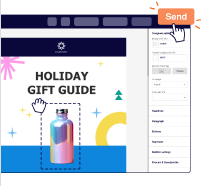Do you still think that events are a waste of money for business and cannot bring concrete results?
85% of business representatives of the top jobs in company management have identified events as critical for their company’s success. And in-person events are back. But virtual components are here to stay. Per the Post Covid-19 Event Outlook Report, 93% of organizers plan to invest in virtual events moving forward.
Let’s find out the definition of event marketing, why it’s so effective for companies and brands, and what events you can use for better results.
What is Event Marketing?
Event marketing is a way to promote a company and its products through events. Organizing or participating in events helps showcase your capabilities, increase brand awareness, find partners, and build strong customer relationships.
Emotions are responsible for consumer attachment to certain brands. And event marketing helps build those connections. Event marketing works like indirect advertising, drawing attention to the brand and creating stronger bonds between the brand and the consumer through positive emotions.
You can use events in the form of online and live conferences, exhibitions, festivals, trade shows, business breakfasts, corporate events, and more to promote your company. At the same time, marketing for event planners, which includes all stages from planning to promotion, will include methods and tools suitable for solving your problems and working with your target audience.
Is Event Marketing Effective?
The effectiveness of using event marketing strategies to achieve business goals is confirmed by statistics and surveys conducted among entrepreneurs and representatives of various B2B and B2C business areas.
Here are just some of the stats from the polls:
- 52% of business holders say that event marketing provides the highest ROI compared to other marketing channels.
- 80% of event marketers say they create a more purposeful experience with their events than they did 2 to 5 years ago.
- High-performing companies spend 1.7 times the average marketing budget on live events.
- 86% of B2B organizations get a positive ROI of their hybrid events after 7 months of the event date.
- Companies that have seen revenue growth of more than 30% over the past couple of years have seen the most increase in their event activity.
Event marketing in current times is effective for achieving business goals and marketing KPIs, increasing profits, and strengthening relationships with potential buyers and customers. However, not all events will be equally beneficial for your brand.
Let’s see which events are the most popular and effective.
7 Successful Event Marketing Examples
Let’s discuss the most popular events to attract the target audience to a brand or product. They work in both B2C and B2B areas with a few differences:
- Events in B2C, when your main goal is to attract visitors who will buy your product in the future, should be focused on there to show personal benefit and form an emotional connection.
- B2B marketing events should be more focused on showing how your event will help grow your business, for example, teach you how to sell more or hire highly qualified staff with the right soft skills.
Among the popular types of promotional events are the following:
Conferences
Conferences are large-scale events in which industry leaders participate. As a rule, one or two topics from global trends are chosen and considered from different angles. The conference schedule includes presentations by exciting speakers, seminars, and workshops.
For example:
- Oracle Code One (formerly known as JavaOne, and in 2022 as CloudWorld), in which programmers worldwide took part in a green initiative.
- WWDC, where Apple connects technology and creativity. Every year they host talented minds who talk about the great concepts behind their innovative processes leading to product and software creation. Activities include classes, workshops, consultations, and meetings.
We are sure you will be able to name 2-3 popular conferences from your industry without a Google prompt.
Trade Shows and Expositions
During trade shows, companies from the same industry can present their products and services related to a common theme. Exhibitions can also be part of larger conferences.
Since many companies are constantly participating in exhibitions with their products, they attract the right target audience well and allow brands to get high-quality leads by collecting contacts immediately at their stands.
For example:
- IMEX America, which takes place in Las Vegas, is a major exhibition for event organizers. More than 3,000 exhibitors and more than 12,000 visitors become participants.
- Computex CNET is an exhibition of computer technologies in which even prominent companies like Intel participate.
Seminars
Seminars are held for a smaller group of participants than the previous two formats and often have a teaching role, giving participants valuable experiential knowledge. Seminars can last one day or even only a few hours. They are often favored by industry leaders (or those who wish to maintain their status as such).
For example:
- The ABM Leadership Alliance held its first workshop in Boston called ABM by the Numbers. The event brought together marketers working in the B2B field. The seminar’s main focus was the development of strategies for effective interventions based on all essential indicators.
Community Events
Did you know that most consumers search for a local company online before purchasing? This is a huge potential market right outside your door.
Community events are held so the local company can make itself known in the nearby community, form a positive image and remain in memory as “cool dudes.” For these events, you can use ideas of any format suitable for you, where there can be a lot of communication and emotions — meetings, business games, marathons, street parties, film screenings, and much more.
For example:
- DeKalb, Illinois, hosts a DeKalb Corn Fest yearly to celebrate the harvest season’s start. Years later, this event gathers more than 100 thousand participants and successfully collects charitable donations.
Special Guest Events
Inviting a special guest is an excellent way to draw attention to your event. Try to reach an influencer in your niche and, ideally, link their name to your brand.
Your guest doesn’t have to be a major celebrity. It just needs to be someone prominent enough in your field who always grabs the attention of the audience you need. It could be the chef of a popular restaurant at an event hosted by a spice manufacturer.
See the example below:
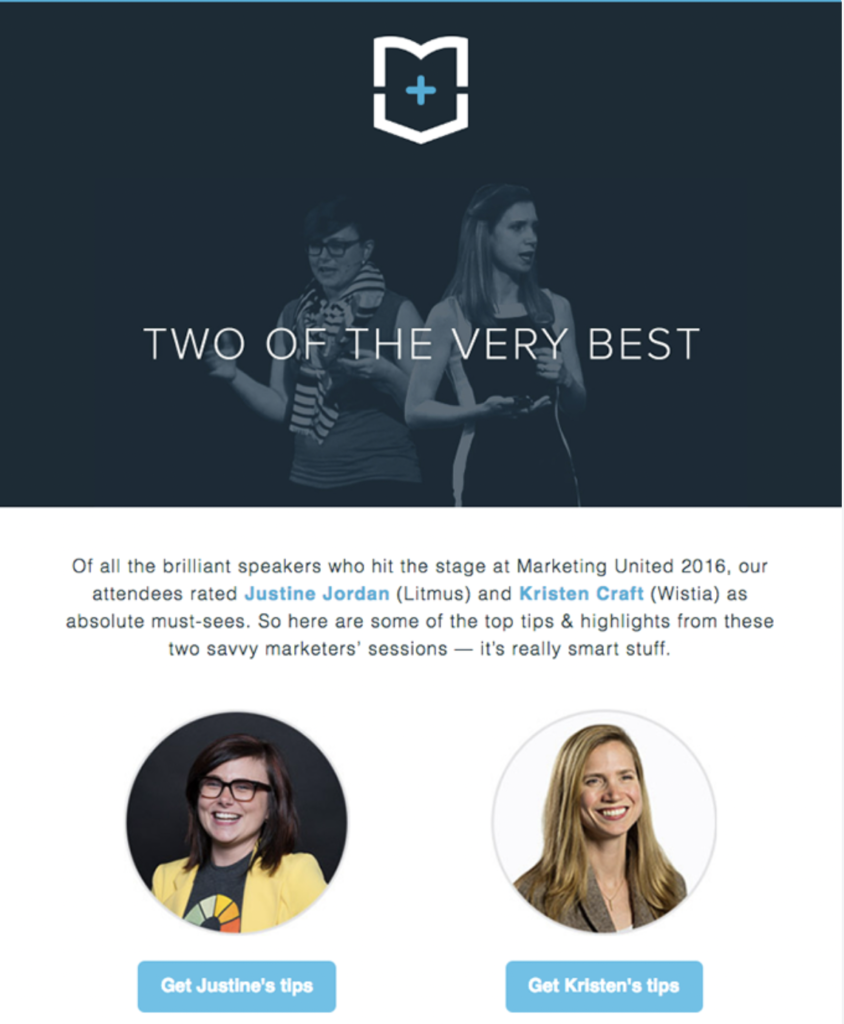
Networking Events
When you organize Networking events, you attract people from a specific area with similar business interests. They come to events to make new connections and partnerships while learning about your brand. Networking events can be part of larger conferences where you have evening meetings to connect participants after a full conference day of speaking.
For example:
- Attendees at the Lean Startup conference were given networking opportunities, such as an evening at the Mob Museum, which helped increase communication.
- The Forbes Under 30 Summit brings together young professionals, top speakers, speed pitches, and the infamous pub crawl.
Product Launches
Product launches are events that are popular in the retail sphere. It helps boost sales of one or more new products that are first introduced to the market.
For example:
- The annual MAX creative conference for Adobe Creative Cloud users to showcase the latest product updates.
- The annual Apple Worldwide Developers Conference usually presents an updated version of the operating system and holds sessions for developers and users of the product.
Tips for Choosing the Event Type
How to prepare and hold an event that can accelerate your business? Rely on these key tips:
- Don’t guess about your audience’s interests; do in-depth research.
- Know the answer to the “why” question — your goal must be specific.
- Speak your brand mission and values at every event and create a unique experience.
Why is Event Marketing Important?
Using event marketing in your promoting strategy provides several crucial benefits.
1. It Grows Brand Awareness
During each event, you will talk about your brand in one way or another. Events help you show the values of the brand, its history, show the character and mood of the brand. Customers find something close to your philosophy and become your clients at a deeper level, returning to you more and more often.
For example, when Red Bull holds its races for different vehicles and parkour competitions, it considers itself a brand for the brave and determined and brings extreme people together. It is with this image in mind that people make further purchases.
2. It Helps Capture Leads
People must register and provide their contact details to participate in any event. At the same time, they do it themselves and already feel reliability and trust in the brand. After the event, you can use these contacts for further cooperation.
Such a list of potential clients will make it easier to expand your marketing base.
Also read: 5 Lead Generation Strategies to Swear by
3. It Builds Solid Connections with Partners
If you have a new brand or startup, participation in events will strengthen connections with your financial partners and show that you are serious about developing your business.
4. It Gives an Opportunity for Mutual Promotion
You can involve other brands in joint events and thus reach mutual promotion. Essentially, you’re pooling marketing bases and creating a common platform to tell your clients about other brands; they’re doing the same for you.
This approach also leads to attracting new customers. Importantly, other companies should not be your direct competitors, but their target audience should be similar to yours. For example, it could be educational entrepreneurs or creative professionals (architects or designers) for whom you offer different products.
5. It Ignites Word-of-Mouth Marketing
Arrangement and participation in events initiate such a forceful wave of promotion as word of mouth, exponentially growing all the previous benefits of event marketing.
Most of this wave comes from social media, as participants love to share their experiences attending cool events on their accounts. They can share photos, slides from PPT presentations, and short videos of interesting speeches.
These posts spark interest from friends and followers and draw additional attention to you. Your task is to satisfy the event guests as much as possible and make it so bright that they want to share it. A great tip here is to create a hashtag for the event. It will help the hype and allow you to track the effect.
The more leads, the brighter all the results will be expressed, so let’s move on to such an essential part of the event preparation as lead generation.
The Best Practices for Event Lead Generation
The foundation of flourishing marketing for event planners includes:
- Making a marketing plan;
- Preparing ad spaces;
- Targeting the right audience;
- Using suitable channels to reach out to this audience.
The primary strategy is to create a landing page or a website where all the important information will be collected.
It should include details about:
- Time and place of the event;
- Format and timeline;
- Who will be interested in the event, and how it will be helpful;
- Information about speakers or workshop leaders;
- Topics of speeches;
- Cost and formats of participation;
- What they need to do to participate — a clear CTA;
- Lead collection form.
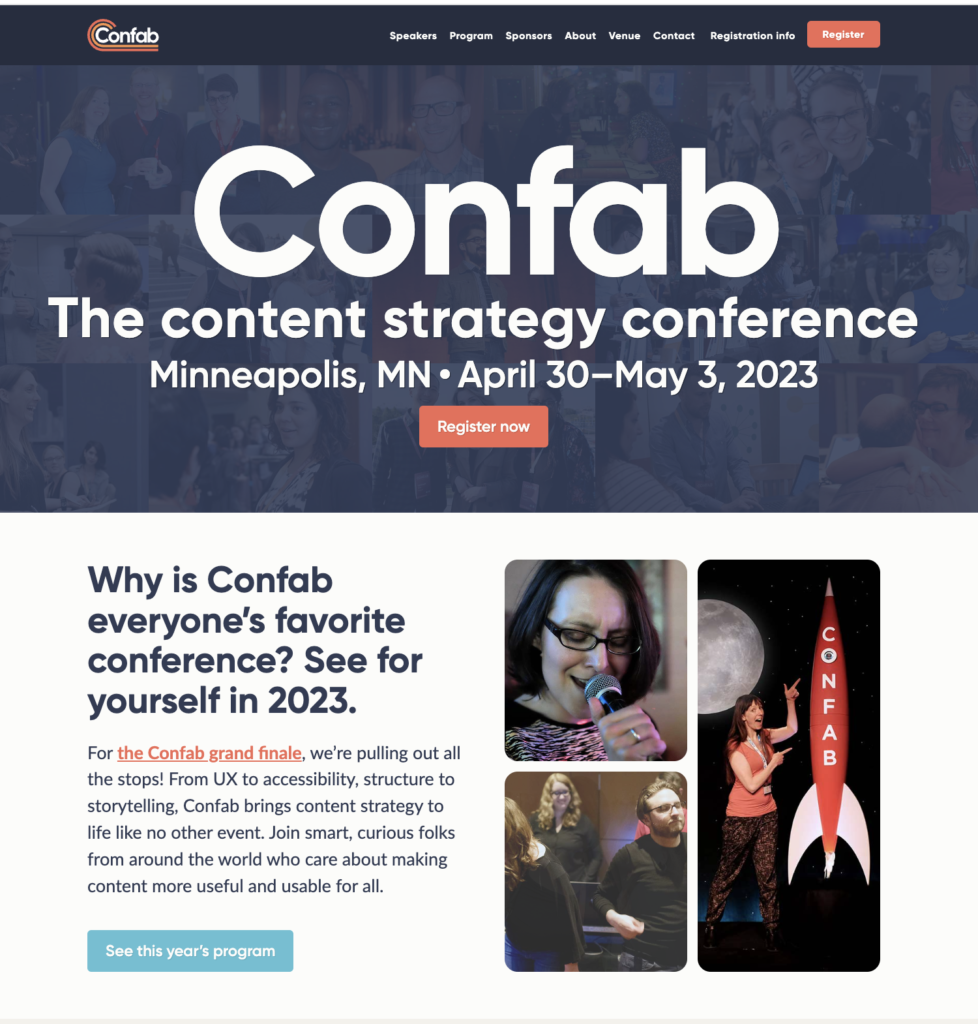
Then you promote the site through all digital channels, using all methods of attraction — advertising campaigns on internet social media, contextual advertising on Google, affiliate mailing lists, speeches at other events, and much more.
Additionally, use the email promo campaigns to attract existing subscribers to the event. We will show you a sample of the Stripo email template for a promo newsletter.
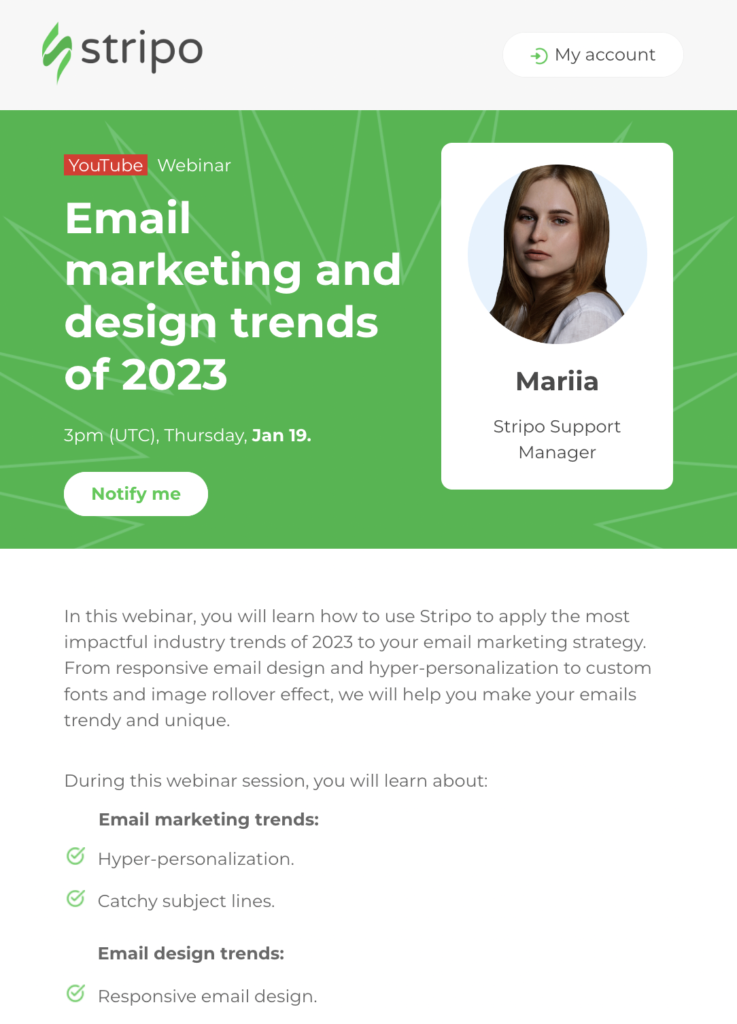
As a result of studying the event site, the visitor will buy a ticket or leave you contact information that will allow you to continue communication. Strategies and tactics for different events will be different, but the methods of collecting leads are very similar.
Here are three of the most popular solutions.
Pop-Ups
Create a popup form on the event website for attendees to register or get more information. Sometimes marketers are afraid that pop-ups will annoy visitors, but the main thing is that they work.
You can easily create popups within Sender. It will take only a few minutes, but it will be super effective for lead generation!

You can offer some registration bonuses, discounts, or event details in the form to make it easier for the reader to decide. Pop-ups catch site visitors at the last moment and prevent them from leaving the website without sharing their contact info.
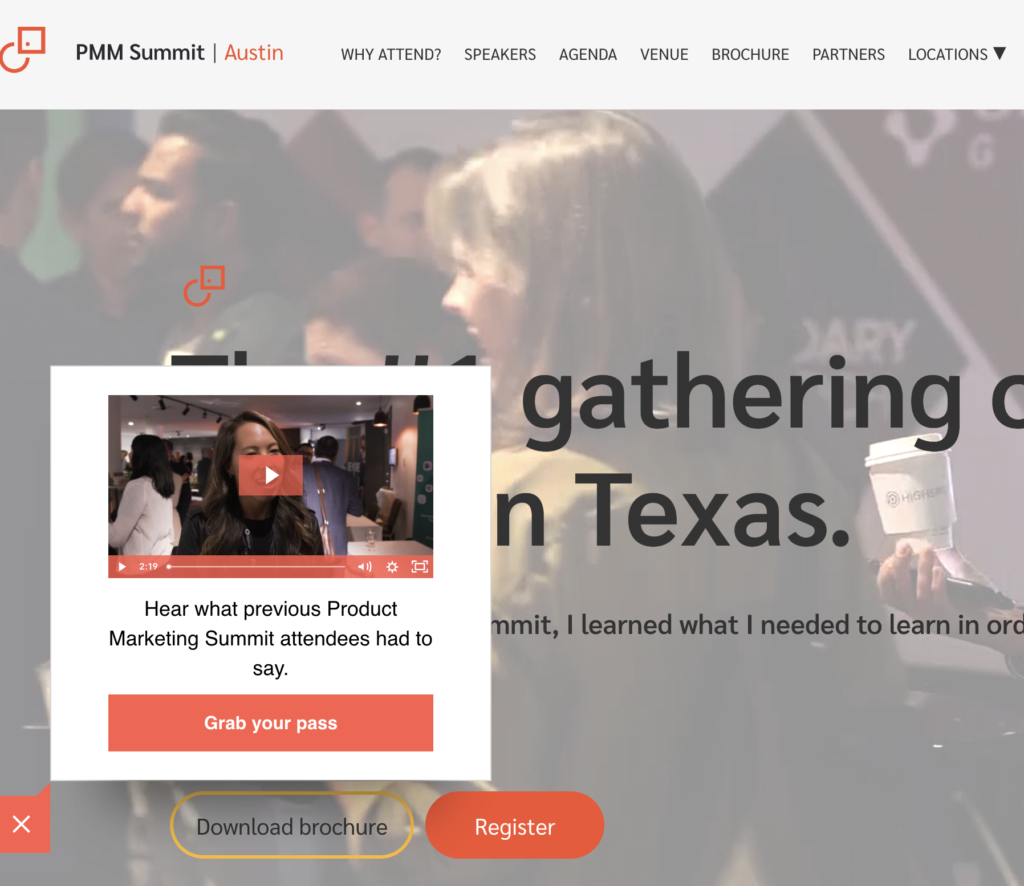
Read how to create a pop-up form quickly in the detailed guidebook.
Sign-Up Forms
Embedded sign-up forms work well for those who have studied the materials on the site and are interested in your event. The event may not be held soon, and you need to keep in touch. Then the visitor will subscribe to the mailing list to receive email newsletters.
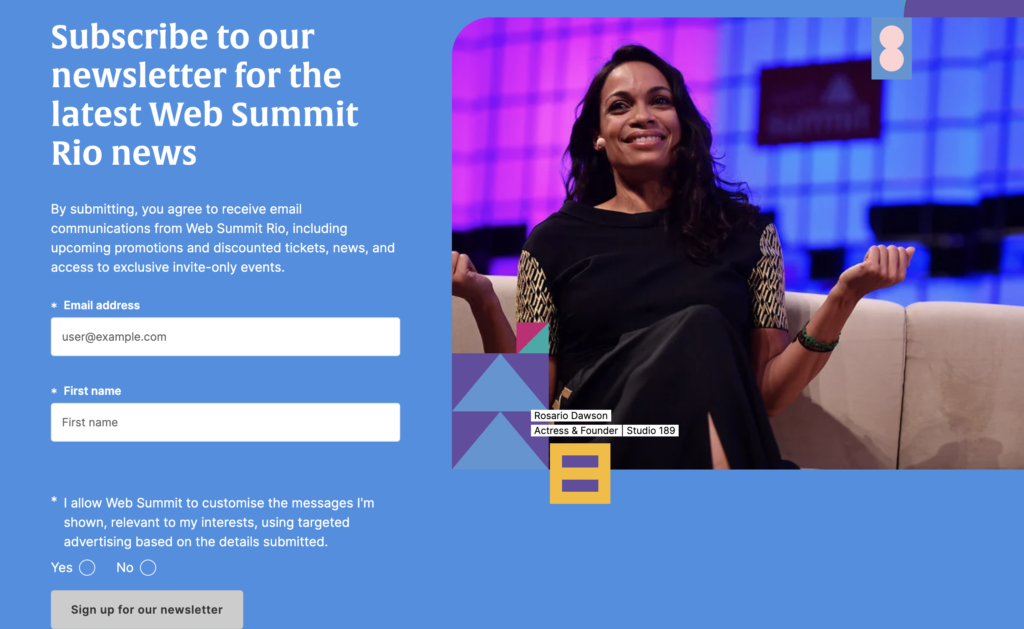
Chatbots
To gather participants for an event, you can use a chatbot. He will answer the most popular questions about the event and guide each visitor until the moment of application or contact details. You can program as many chains for the chatbot as you need and entrust the initial communication on the site in WhatsApp or Facebook Messenger.
Here is an example of how a chatbot works on the B2B Marketing EXPO website — it allows you to choose one of three options and then leads everyone through their marketing funnel.
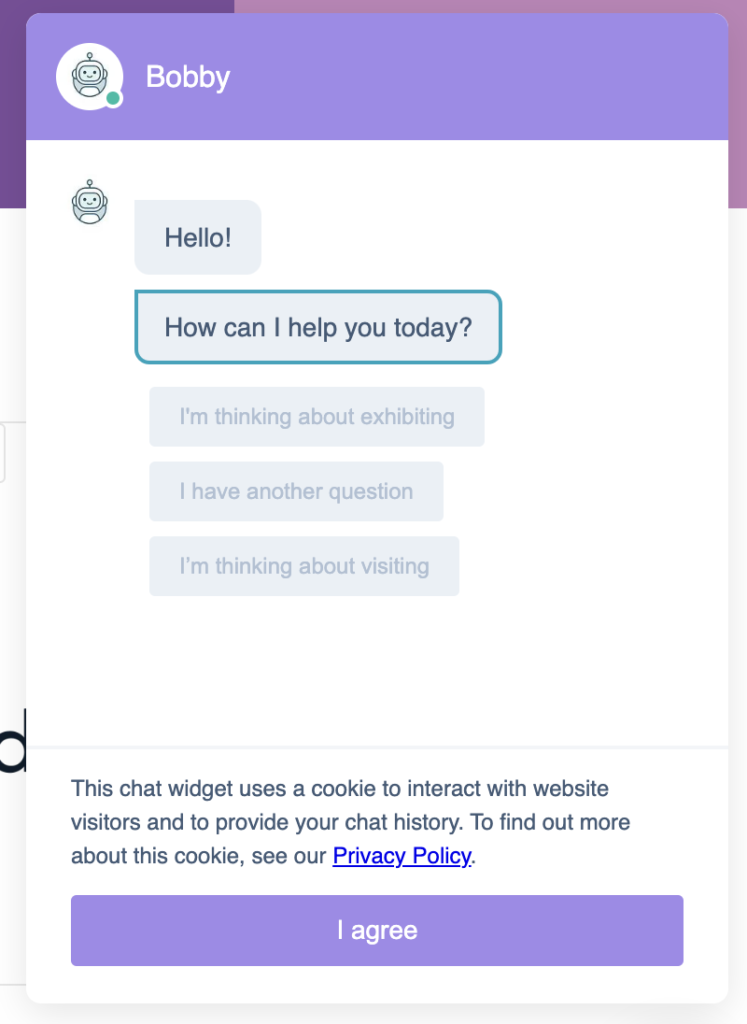
Benefit from Pre-Event Emails
Communicating properly with those who have registered for the event is essential. Prepare trigger email newsletters – event reminder emails for them, in which you will discuss the preparation of the event, clarify the program, send an activity calendar, and share exciting facts about the speakers and thematic selections.
You can also enable promo codes or discounts that are valid for a limited time.
Key Takeaways: Event Marketing
To make event marketing a successful part of your total marketing strategy, remember these key things:
- Choose the type and theme of the event depending on the characteristics of your target audience;
- Always strongly associate the event with your brand so that the participants have an emotional connection with it;
- Think over each step and each channel of the event promotion in detail and start early to collect the maximum number of leads;
- Create an Internet platform convenient for customers, where there will be all the information about the event and several ways to leave a contact – popup, sign-up form, and chatbot;
- Remember that the event is only the starting point in communication with your client. So remember to keep communicating after the event as part of your digital marketing strategy.
Events aren’t the most accessible tool, and preparation requires significant efforts from the entire marketing team, but the effect of brand promotion is worth it. Try it, and your brand will benefit from it.
Also read:
- What is Webinar Marketing? Definition, Strategies, Examples
- Event Email Marketing Timeline: A Step-by-Step Guide
- 11 Email Invitation Examples and Templates that Excite
Author Bio
Alina Samulska-Kholina is a copywriter at Stripo. She is passionate about marketing and believes marketing drives business — through texts, effective design, and interactivity. So she tries to make each piece of content useful and interesting.
